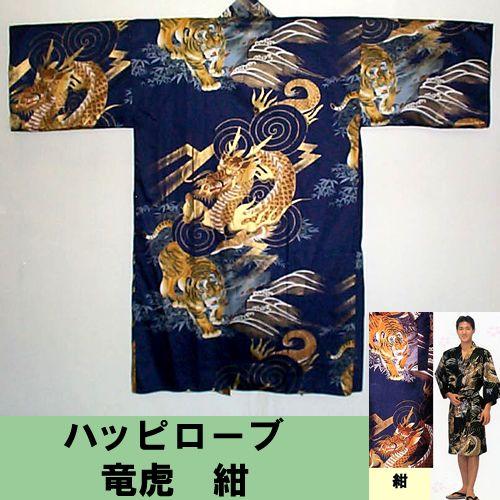The happi coat is probably the most informal and casual traditional Japanese garment you will ever find.
It’s best known as a festive, festival outfit. Outside of Japan, it hasn’t gotten as much attention as the kimono or yukata. Internet search engines don’t help matters by misreading the name “happi” as “happy” (which makes it tricky to find information online).
Regardless, the happi coat is a fun and easy-to-wear item which you might want to add to your wardrobe.
So, what is a happi coat?
Happi basics

The happi coat is a lightweight garment, typically made of cotton or polyester. Like a lot of traditional Japanese outfits, a happi coat has long, wide sleeves, and a ‘T’ shape when displayed.
However, unlike yukata, a happi is not a long robe, but a coat or jacket. It can be tied shut with a simple obi belt. But, it can also be worn open. When wearing a happi, you should definitely wear a T-shirt or something underneath, and some shorts or pants below that.
The happi coat probably originated during the Edo period (1603-1867) as an outfit for servants. The coat would have a rich family’s mon (crest) on the back for easy identification. It was also worn by firefighters for the same reason.
According to reports, some tradespeople and shop owners also picked up the habit of wearing the easily-recognizable coats.
Many modern happi coats still have some sort of team or company logo on the back. The happi coat’s other distinctive marking would be on the front collar, where the organization’s name can be written.
Unlike a kimono, a happi coat is relatively easy to put on, and there aren’t nearly as many etiquette rules to follow. With a few exceptions, happi coats are also unisex.
When to wear happi coats

Nowadays, the happi coat is typically associated with festivals. However, sports fans and others have also been known to wear them. Special happi coats were made for the Tokyo Olympics.
It can also be worn as loungewear around the house. But, you should avoid wearing a happi coat in everyday situations, unless you want people to ask where the matsuri (festival) is.
The taiko drummer keeping the rhythm during an Obon folk dance festival, or the people carrying a mikoshi (portable shrine or palanquin) will typically wear a happi coat. In general, the happi coat makes a reasonable festival alternative if you find putting on a yukata is too complicated or restrictive.
Personally, I have seen plenty of happi coats at Japanese American festival events here in Southern California. Cultural organizations, Buddhist temples, and other groups will have personalized happi coats made.
A happi coat is also the stereotypical outfit of the Japanese idol fan, who wears one at concerts, along with a matching headband and light sticks. You can buy happi coats featuring idol stars — whether real, anime, video game, or Vocaloid — such as this BanG Dream! happi coat found at ZenPlus.
If you see a happi coat in an anime series, it’s probably a festive occasion, such as the aforementioned festival, or an idol concert.
Haori vs. hanten vs. happi

The happi coat has a lot of similarities with both haori and hanten. All three can be described as coats or jackets. All three are traditional Japanese garments. But they should be treated as different Japanese items.
For one thing, the materials are different. The happi is lightweight and casual. The hanten is heavier, with padding similar to a winter coat. A good haori should be made of silk, not the cotton of happi or hanten.
Historically speaking, the haori was typically worn by men over a kimono. If the kimono is more formal than a yukata, then the haori is definitely more formal than a happi. The haori is also older than the happi.
As an outfit originally designed for servants, the happi lacks this level of formality.
I hope this helps you understand the happi coat.
Purchase One From ZenPlus:
Check out a great selection of happi coats from these awesome Japanese sellers.



